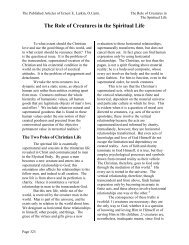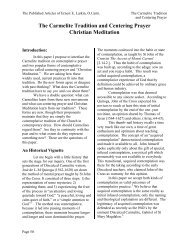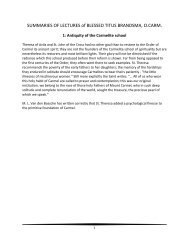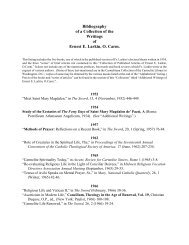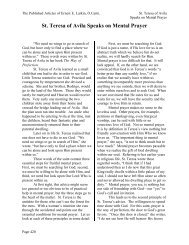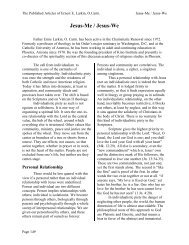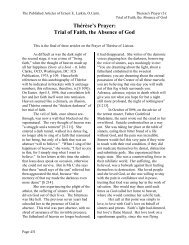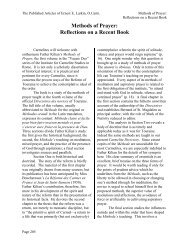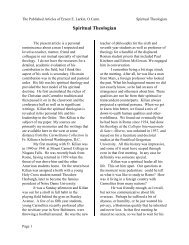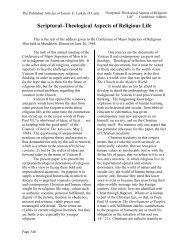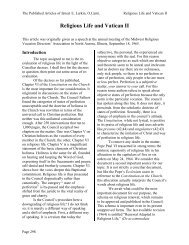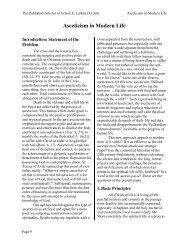Christian Spirituality - Carmelnet
Christian Spirituality - Carmelnet
Christian Spirituality - Carmelnet
Create successful ePaper yourself
Turn your PDF publications into a flip-book with our unique Google optimized e-Paper software.
The Published Articles of Ernest E. Larkin, O.Carm. <strong>Christian</strong> <strong>Spirituality</strong><br />
The spiritual life is the <strong>Christian</strong> life<br />
lived with some intensity. It is the serious<br />
response of man to the revelation of God’s<br />
love in Christ and consists in loving<br />
knowledge and service of God and one’s<br />
fellow men in the Mystical Body of Christ.<br />
<strong>Christian</strong> spirituality begins when God’s word<br />
is accepted in faith. It manifests itself in the<br />
expression and the development of the love of<br />
God in prayer and action. It is the subjective<br />
assimilation and living in charity of the<br />
objective, theological realities of revelation.<br />
Since its object, origin and goal is God<br />
in His personal life, <strong>Christian</strong> spirituality is<br />
interpersonal; it is the life of man with God.<br />
Men are given this new relationship with the<br />
Trinity gratuitously, and they express it in acts<br />
that are at once human and transcendent. The<br />
open, free, and in some sense unlimited<br />
human spirit can express itself only in<br />
dependence on the material, the finite and<br />
particular, hence little-by-little and in time.<br />
This particularized condition of existence is<br />
reinforced in <strong>Christian</strong>ity by the fact that grace<br />
is union with an historical person, Christ (Acts<br />
2.38), and a participation in the sacred events<br />
called mysteries in His life. At the same time<br />
the new life in Christ is trans-historical and<br />
supernatural (Gal 2.20); it is nothing less than<br />
the life of the Holy Spirit, the Spirit of the<br />
Son, in man (Rom 8.14-16).<br />
This brief identification of <strong>Christian</strong><br />
spirituality has three distinguishing features<br />
that will be examined separately. They are the<br />
interpersonal, the historical, and the<br />
transcendent aspects of <strong>Christian</strong> spirituality.<br />
Interpersonal Life<br />
The meaning of interpersonal life can<br />
best be examined by considering the<br />
encounter with which it begins and the<br />
community or fellowship of life that follows.<br />
Page 75<br />
<strong>Christian</strong> <strong>Spirituality</strong><br />
Encounter. Men as children of Adam<br />
are born estranged from God. <strong>Christian</strong><br />
spirituality begins for them with their<br />
encounter with God who comes to them in<br />
Christ. This encounter is not a mere<br />
psychological construction, like an imagined<br />
visit with an absent person. The encounter is<br />
primarily ontological, founded on the real<br />
objective, superconscious union with God in<br />
grace (Gal 3.2-5). But encounter in the<br />
spiritual life is more than ontological union. It<br />
is the intellectual and affective realization of<br />
the I-thou relationship of grace as well, the<br />
conscious experience of God who calls in love<br />
and is answered in faith. This experience or<br />
consciousness is not necessarily immediate<br />
and direct, like the feeling of God’s presence<br />
in the classical mystical experience of God. It<br />
takes many forms, but basically it is an<br />
awareness and conviction that God is a<br />
person, that He is real and His love is real, and<br />
that this love freely accepted makes man a<br />
friend of God sharing God’s own life.<br />
<strong>Christian</strong> spirituality is neither abstract<br />
knowledge nor mere moralism (1 Cor 13.1-3).<br />
It is not a human system of self-perfection,<br />
even in the moral or religious order, nor a<br />
program of psychological conditioning to<br />
induce certain “states of soul.” <strong>Christian</strong><br />
spiritual life involves knowledge, moral effort,<br />
and spiritual exercises, but essentially it is a<br />
person-to-person contact between God who<br />
speaks to man in His Word and man who<br />
responds in the Word in loving faith (1 Thes<br />
2.13). It is a dialogue with God in love—life<br />
with the Father, in the Son, through the Holy<br />
Spirit. The spiritual life is eternal life and<br />
consists in knowledge and love of the Father<br />
and the Son (Jn 17.3) and in living as sons in<br />
the Son in fraternal love (1 Jn 4.7-8; Jn 15.4-<br />
10).<br />
The personal response to God in faith<br />
and love is the “theologal” life, the concrete
The Published Articles of Ernest E. Larkin, O.Carm. <strong>Christian</strong> <strong>Spirituality</strong><br />
expression of the theological virtues. The<br />
theologal life can be compared to the moral or<br />
ascetical life as later and earlier stages of<br />
spiritual growth, corresponding to the ancient<br />
distinction between contemplative and active<br />
life. Such stages describe states of soul in<br />
which either the theological or the moral<br />
elements are more obvious, but both elements<br />
are part of every degree of spirituality.<br />
Otherwise there would be the error of<br />
psychologism or moralism, both of which are<br />
counterfeit spirituality. The first consists in a<br />
superficial consciousness of God<br />
independently of the orientation of faith, hope,<br />
and charity, which may or may not be present.<br />
This is more akin to aesthetic feeling than to<br />
true religion. Moralism is moral effort without<br />
relation to God. In authentic <strong>Christian</strong><br />
spirituality, the theological virtues unite the<br />
soul with God, while moral virtues dispose for<br />
this union by removing obstacles and by<br />
executing the commands of love. Moral<br />
virtues purify spiritual vision by allowing the<br />
light of faith to enlighten and manifest the<br />
Mystery of Christ (Eph 4.17-24); at the same<br />
time they strengthen the capacity for personal<br />
commitment and love by removing voluntary<br />
self-centered attachments that close the soul to<br />
God.<br />
For the <strong>Christian</strong> there is no value in<br />
pure asceticism, unrelated to friendship with<br />
God, or in a self-redemptive, external<br />
observance of the law. The law in fact is a<br />
shackle if it is performed for its own sake<br />
(Rom 7.13-23). <strong>Christian</strong> law supplies<br />
guidelines only and exists because of the<br />
imperfect spiritualization of the faithful. The<br />
local dynamism of the <strong>Christian</strong> life is found<br />
not in particular forms or laws, but in charity<br />
and the Holy Spirit, who leads the sons of God<br />
in perfect freedom (Rom 8.14-16). But<br />
virtuous works are the good fruit produced by<br />
the Holy Spirit and a Witness to His presence<br />
(Gal 5.22-26). The Church today wisely<br />
interprets heroic virtue to be proved by the<br />
constant and faithful fulfillment of duty. It<br />
Page 76<br />
reasons that given the weakness and instability<br />
of fallen man, only the gifts of the Holy Spirit<br />
are a sufficient explanation of perfect<br />
perseverance in good works [Gabriel of St.<br />
Mary Magdalen, “Present Norms of<br />
Holiness,” in Conflict and Light (New York<br />
1952) 154-169].<br />
Community. Man encounters God in<br />
the Word of God (1 Thes 2.13). The Word is<br />
not only the saving actions of God, apostolic<br />
preaching, or the inspired accounts in Sacred<br />
Scripture; it is especially and above all Christ<br />
Himself, the Substantial Word of the Father<br />
(Jn 1.14; 6.35, 54). He is the living Word that<br />
vivifies and brings to fulfillment the words<br />
and acts of the past and in Whom in the<br />
economy of his redemption man makes his<br />
personal response to God’s love. Concretely<br />
the Word comes to us through the Church; the<br />
Church is the fundamental sacrament<br />
revealing and communicating the Word to<br />
men.<br />
The consequences of this truth in the<br />
spiritual life are manifold, as will be seen in<br />
the next section. Here one central implication<br />
is singled out, the fact that encounter with God<br />
occurs in community, in the fellowship of<br />
Christ’s Body, the Church.<br />
The Christ in whom men meet the<br />
Father is not the Christ of memory alone, but<br />
one who lives on mystically and sacramentally<br />
in His followers (Acts 9.5; 1 Cor 8.11-13).<br />
The Church is Christ acting now, sanctifying<br />
men and offering men access to the Father<br />
(Eph 2.18). The Church is constantly reliving<br />
the life of Christ, especially the paschal<br />
mystery of “passing over” to the Father (cf. Jn<br />
13.1; 1 Cor 5.7). Liturgically it makes present<br />
this passage, and historically its members<br />
recapitulate in their own lives the journey<br />
from sin to grace.<br />
Life with the Father is life in the Son;<br />
life in the Son is a communal existence with<br />
other sons in the Son, hence with one’s<br />
brothers. An individualistic God-and-I<br />
relationship is foreign to an informed
The Published Articles of Ernest E. Larkin, O.Carm. <strong>Christian</strong> <strong>Spirituality</strong><br />
<strong>Christian</strong> consciousness. Liturgical life, the<br />
source and summit of <strong>Christian</strong> life, is<br />
communal by nature, since the liturgy is the<br />
Mystical Body, Head and members together,<br />
worshiping the Father and sanctifying men.<br />
Private prayer likewise demands fraternal<br />
unity (Mt 5.23-24). Charity itself is<br />
necessarily social, since the same one virtue is<br />
exercised toward God and toward one’s<br />
fellowmen (Mt 25.35-40). The <strong>Christian</strong><br />
cannot afford to seek the transcendent God in<br />
contemplation and avoid Him in those who<br />
share His life. God dwells among men (Jn<br />
1.14) as well as in inaccessible light (1 Tm<br />
6.16), and neither presence can be neglected<br />
without compromising <strong>Christian</strong> life. This<br />
does not automatically spell out the forms the<br />
engagement to one’s fellowmen will take. The<br />
call may be to silence and solitude in<br />
canonical contemplative life, which according<br />
to Pope Pius XII is “intrinsically apostolic”<br />
[ActApS 43 (1951) 32]. Or it may be a<br />
vocation to social action in the world.<br />
Whatever the vocation there is no<br />
sanctification independently of the visible<br />
community and no love of God without a<br />
genuine, personal love of neighbor, for “if<br />
anyone says he loves God and hates his<br />
brother, he is a liar” (1 Jn 4.20).<br />
Historical Nature<br />
<strong>Christian</strong>ity is a historical religion; it is<br />
a Person (Christ) and His saving deeds (Acts<br />
10.37-42), especially His death and<br />
Resurrection, the paschal mystery, before it is<br />
a philosophy or a theology. Only by union<br />
with that Person through faith and Sacrament,<br />
only by reliving and assimilating the sacred<br />
events of His life, does the <strong>Christian</strong> make<br />
contact with God, undergo the transforming<br />
influence of grace, and achieve perfect<br />
friendship with God. From this point of view<br />
<strong>Christian</strong> spirituality is the living of the<br />
mystery of Christ.<br />
The Mystery of Christ. St. Paul calls<br />
the full divine plan revealed in the New<br />
Page 77<br />
Testament the mystery of Christ (Col 1.25-27;<br />
Eph 1.8-10; Rom 16.25-27). This mystery is<br />
Christ in His personal identity and in saving<br />
acts, especially the paschal mystery of His<br />
death and Resurrection. Salvation history<br />
culminates in the paschal mystery. Its final act<br />
will be the Parousia, the unveiling of the<br />
mystery. In the present time, between the<br />
Ascension and the Second Coming, the<br />
mystery of Christ consists in the subjective<br />
application of Christ’s work to men. The<br />
mystery now is the Risen Christ, who having<br />
been lifted up on the cross draws all men and<br />
all creation to Himself (Jn 12.32). It is “Christ<br />
in you, your hope of glory” (Col 1.27).<br />
In a certain trans-historical sense<br />
<strong>Christian</strong>s are already redeemed (Rom 8.24-<br />
25; 31-39). The baptized have gone down into<br />
the tomb with Christ and died to sin; they have<br />
risen with Christ to newness of life (Rom 6.2-<br />
11). Union with Christ glorified is so vivid in<br />
Paul’s mind that he sees his fellow <strong>Christian</strong>s<br />
already enjoying their risen status and seated<br />
at the right hand of God (Eph 2.5-6). This has<br />
been called the constitutive aspect of<br />
redemption in Christ. It is salvation in<br />
mystery, in signs that witness though they do<br />
not fully reveal the reality; it is mystical<br />
identification with Christ. See Albert Plé,<br />
Mystery and Mysticism (London 1956) 1-17,<br />
and other essays in this volume.<br />
But in point of historical fact there is<br />
also a progressive assimilation of the paschal<br />
mystery. Mystical identity must be translated<br />
into moral action. “Therefore,” says Paul, “if<br />
you have risen with Christ, seek the things that<br />
are above” (Col 3.1). Liturgical reliving of the<br />
death and Resurrection must be complemented<br />
by the actual crucifixion of one’s sins and<br />
vices (Gal 5.24) and the effort to follow the<br />
lead of the Holy Spirit. Because it is the Cross,<br />
the process involves suffering; because it is<br />
the Resurrection, there is joy. The sacrifice of<br />
self expressed symbolically in the Mass of the<br />
liturgy becomes the self-surrender to God’s<br />
will in the free choices of dai1y life; the Mass
The Published Articles of Ernest E. Larkin, O.Carm. <strong>Christian</strong> <strong>Spirituality</strong><br />
and life together achieve the sanctification of<br />
the <strong>Christian</strong> and the worship of God.<br />
In liturgical celebration and daily life<br />
<strong>Christian</strong>s make their passage from flesh to<br />
spirit, from separation from the Father to<br />
communion with Him. This progressive<br />
transformation, which is the <strong>Christian</strong>’s pasch<br />
or passage to the Father (Jn 14.4), takes place<br />
in company with Christ and the people of<br />
God. The <strong>Christian</strong> goes out of this world to<br />
the Father not in the sense that he leaves this<br />
world materially (Jn 15.18-19), but insofar as<br />
be rejects the isolated, independent world at<br />
enmity with God and embraces the redeemed<br />
world that takes its meaning from the Spirit. In<br />
other words the pasch is not a movement away<br />
from people or terrestrial realities to<br />
abstraction and immateriality, but a<br />
commitment to God’s people and the<br />
abandonment only of selfishness and egoism.<br />
This process is the work of the Spirit; the<br />
<strong>Christian</strong> cooperates by discerning approving,<br />
and implementing the movements of grace In<br />
this way the whole Body of Christ is brought<br />
“to perfect manhood, to the mature measure of<br />
the fullness of Christ” (Eph 4.13) and the<br />
kingdom of Christ is established in the cosmos<br />
(Eph 1.10).<br />
Application of the Mystery. The<br />
mystery of Christ is mediated to men through<br />
the visible structures of <strong>Christian</strong> life, all of<br />
which are found in the Church The Church is<br />
the Bride of Christ and in this capacity sees<br />
Mary as its perfect archetype and mother of all<br />
who answer the call of the Bridegroom. The<br />
Church looks to Mary as model because of her<br />
“fiat,” which was a total surrender to God’s<br />
will, and it goes to her as the Mother of grace<br />
who forms men in the image of the Son (Jn<br />
19.25-27). In its ministry of word and<br />
Sacrament the Church presents the Word to<br />
men and conveys the response of her children<br />
back to the Father (Eph 5.25-27). <strong>Christian</strong><br />
spirituality is stamped by all these<br />
characteristics. Christocentric through and<br />
through, it is ecclesial, Marian, Biblical, and<br />
Page 78<br />
liturgical. Each note is necessary, though the<br />
forms and their coordination in a given<br />
synthesis of <strong>Christian</strong> life will vary. Different<br />
spiritualities are possible in the Church,<br />
precisely because there are different ways of<br />
applying and interrelating the dogmas of the<br />
faith.<br />
The living of these dogmas is not<br />
achieved completely and perfectly in the first<br />
act of acceptance. Modern authors (e.g., P.<br />
Fransen, M. Flick, Z. Alszeghy, and K.<br />
Truhlar) present a dynamic picture of man’s<br />
personal growth in grace by appealing to the<br />
two kinds of will acts suggested by S.<br />
Kierkegaard. The fundamental option is made<br />
in favor of God revealed in Christ by faith and<br />
Baptism, but it is deepened by the daily<br />
choices of <strong>Christian</strong> life. Free choices are<br />
ineluctable for man, and every choice<br />
strengthens or weakens his ultimate<br />
orientation toward God or self, toward<br />
freedom or servitude. The “person” emerges<br />
from his experience; he is the product of the<br />
infinite ways be has chosen to direct his<br />
energies and consent to or dissent from grace.<br />
In this way the <strong>Christian</strong> gradually “puts on<br />
Christ” (Rom 13.14), builds himself as the<br />
temple of the Holy Spirit (1 Cor 6.20), and<br />
grows in the likeness of Christ (2 Cor 3.18).<br />
The most important: element is the constant in<br />
the process, the fundamental option the Bible<br />
calls it the heart of man (Rom 5.5; 6.17; 8.27);<br />
it is the person who is evolving. Yet the<br />
particular choices are likewise important since<br />
they are building up or tearing down this basic<br />
option and no choice goes uncounted. The<br />
present choice builds on past ones and<br />
prepares for future ones. Only the last choice<br />
of man’s life, the final option which takes<br />
place in the moment of death, is believed to<br />
express fully the heart of man because it sums<br />
up and recapitulates his whole life.<br />
The contrary of the love of God is<br />
selfishness, which is voluntary opposition to<br />
the movements of grace. This willful<br />
selfishness diminishes with growth in grace
The Published Articles of Ernest E. Larkin, O.Carm. <strong>Christian</strong> <strong>Spirituality</strong><br />
because the love of God brings the virtues in<br />
its train. The virtues bring reason and order<br />
into the faculty, of the soul, at once<br />
humanizing and spiritualizing psychophysical<br />
structure. They place the whole man at the<br />
service of charity. The sign of perfect<br />
transformation is perfect conformity of will<br />
with God, even to the point where the first<br />
movements of the soul are directed toward<br />
God (St. John of the Cross, Spiritual Canticle<br />
B, 28.5). Such persons are completely<br />
possessed by the Holy Spirit.<br />
Does the presence of contrary<br />
movements in the psyche of man even though<br />
they are non-voluntary argue to less than<br />
complete spiritualization and perfection? This<br />
question, one aspect of the relationship<br />
between the psychic and the spiritual, is not<br />
adequately answered as yet. Non-voluntary<br />
movements as such are not opposed to virtue,<br />
since virtue is a voluntary condition, a habitus.<br />
But how is one to gauge the voluntary and<br />
non-voluntary in these psychic factors?<br />
Moreover, they at least occasion disordered<br />
choices by drawing the will after them. In the<br />
practical order psychic weaknesses can make<br />
striving after perfection very difficult; extreme<br />
instability or imbalance may even make<br />
sanctity impossible not because of an intrinsic<br />
but only an extrinsic connection. Psychic<br />
health, on the other hand, while negative in<br />
sanctifying power, places fewer obstacles in<br />
the way and supplies a good natural base for<br />
the reception of grace. Emotional maturity<br />
easily becomes natural virtue, and natural<br />
virtues, such as authenticity, honesty, courage,<br />
and community spirit, clear the underbrush for<br />
the freer growth of grace. But one must<br />
proceed cautiously in theorizing about these<br />
areas. Above all, the psychic (or the “natural”<br />
generally) must not be confused with the<br />
spiritual. But the two areas touch at many<br />
points. The relationships between the soul and<br />
the psyche, between maturity and sanctity,<br />
between neurosis and sin, are at present<br />
subject to different opinions among the<br />
Page 79<br />
experts and need further research and<br />
reflection.<br />
The regime of the spirit extends into<br />
all the areas of human life. Growth does not<br />
automatically mean a reduction of human<br />
commitments or withdrawal from human<br />
engagements. The spiritual man enters within<br />
himself in the sense that he possesses himself<br />
at the core of his being and can dispose of<br />
himself in greater liberty toward God and men<br />
and the cosmos. The journey within is the<br />
journey into reality.<br />
The interior life, meaning the life of<br />
prayer, is not the whole spiritual life. For<br />
contemplatives it is the principal part of their<br />
vocation and it is an element in every<br />
<strong>Christian</strong> life. But the spiritual life is service<br />
as well as knowledge and love of God. It is<br />
human life metamorphized, the body-soul<br />
composite animated by the Holy Spirit; the<br />
spiritual life is not the natural life of the<br />
immaterial soul. Spiritual has this meaning in<br />
Sacred Scripture (e.g., 1 Cor 2.13-14) and it is<br />
contrasted to carnal, which describes fallen<br />
man who lacks grace, the un-regenerated man<br />
considered on any level of his life, whether of<br />
instinct, emotion, intellect, or will. Pride of<br />
intellect is carnal, whereas <strong>Christian</strong> marriage<br />
is spiritual. The temporal order, social action,<br />
the apostolate in all its forms are part of<br />
<strong>Christian</strong> spirituality. The whole of life ideally<br />
comes to be looked at as a function of charity<br />
and each act a response of the new creature to<br />
the Word of God.<br />
Supernatural Quality<br />
Everything human is to be renewed<br />
and integrated into the new creation by the<br />
power of the Holy Spirit (2 Cor 5.17; Gal<br />
6.15), yet no created form, effect, or<br />
manifestation exhausts or confines or even<br />
adequately expresses the life of the Spirit. God<br />
acts in and affects the particular and the finite:<br />
this is the ongoing, incarnational aspect of<br />
salvation history. The apostle John aludes to<br />
this aspect when he writes: “Behold what
The Published Articles of Ernest E. Larkin, O.Carm. <strong>Christian</strong> <strong>Spirituality</strong><br />
manner of love the Father has bestowed upon<br />
us, that we should be called children of God;<br />
and such we are” (1 Jn. 3.1). But just as God<br />
is beyond any of His acts or effects in history,<br />
so the life of grace is a supernatural<br />
relationship that places it beyond any of its<br />
particular expressions. This is its transcendent<br />
“eschatological” aspect that will be fully<br />
revealed in the Parousia: “Beloved, now we<br />
are the children of God, and it has not<br />
appeared what we shall be. We know that,<br />
when he appears, we shall be like to him, for<br />
we shall see him just as he is” (1 Jn 3.2).<br />
The spiritual life is Trinitarian life,<br />
essentially supernatural, hence beyond any<br />
creature’s abilities or demands. It is a spiritual<br />
life of knowledge and love that belongs to<br />
God’s own level of existence. Because it is<br />
God’s life, its every expression in man—the<br />
moral act, the religious experience, the<br />
apostolic service—falls short of the divine<br />
reality, even though these individual acts are<br />
the workings of the Spirit. God is greater than<br />
any finite knowledge of Him, more lovable<br />
than any created love can envisage. There is<br />
no perfect correlation, therefore, between<br />
grace and human behavior or grace and any<br />
human experience. A <strong>Christian</strong>’s knowledge,<br />
love, and service of God are incarnations of<br />
the Trinitarian life he shares; but God is<br />
greater than the incarnations, and union with<br />
Him is what is sought. A description of this<br />
supernatural quality and an indication of its<br />
implications in the matter of prayer and selfdenial<br />
in <strong>Christian</strong> spirituality now follows.<br />
Life of Grace. Scripture uses many<br />
analogies to convey the meaning of this<br />
mystery. The life of grace is a participation in<br />
divine life (2 Pt 1.4; Gal 2.20), sonship (Rom<br />
8.14-16, 23), friendship (Jn 15.14-15), and<br />
possession by the Spirit (Rom 8.9; Eph 1.13)<br />
or by the indwelling God (Jn 14.23; 1 Jn 4.12-<br />
13; 1 Cor 3,16). The Scriptural as well as the<br />
patristic perspective centers on Uncreated<br />
Grace, an approach that serves to bring out the<br />
transcendent quality of <strong>Christian</strong> spirituality.<br />
Page 80<br />
So the spiritual life is the Spirit received, and<br />
sanctifying grace, the effect of this Presence, a<br />
“being possessed” (Latin habitus) by God,<br />
who first possesses the soul. Possession by<br />
God is the same as the divine indwelling,<br />
according to the Scriptures (cf. 3 Kgs 8.27-30;<br />
9.3). When God fully possesses the person,<br />
the spiritual activity is closest to God’s own.<br />
He is attained in ever-purer faith and love with<br />
the accompanying, proportionate affective<br />
detachment and poverty of spirit. To move<br />
toward God is to move out of a world<br />
measured by the created and finite and into<br />
God’s world where He Himself is the measure<br />
(1 Cor 3.22).<br />
Just as the transcendent God was<br />
“truly in Christ, reconciling the world to<br />
himself” (2 Cor 5.19), so He is in the world of<br />
men in the continued mediations of Christ’s<br />
presence. Men will find Him in proportion as<br />
they are transformed in God by grace, i.e., in<br />
proportion as they rise above themselves.<br />
Thus the spiritual life is fully achieved when<br />
the <strong>Christian</strong> attains God, while remaining<br />
himself with his own knowledge and love, his<br />
own intimacy and conscious friendship with<br />
God; this occurs when he is lost, transformed,<br />
and identified with God, without losing his<br />
own identity. A profound exposition of this is<br />
to be found in the transforming union of St.<br />
John of the Cross (e.g., The Ascent of Mount<br />
Carmel 2.5), which we follow here, in the<br />
conviction that this is the universal goal of<br />
<strong>Christian</strong> life. St. John attributes the<br />
transformation to love. Perfect love produces<br />
perfect likeness, indeed it produces<br />
identification in the intentional order. Thus<br />
perfect love makes one know and love not<br />
only like the Beloved but as one with Him.<br />
When a man is no longer a prisoner in the<br />
closed universe of the merely human, and his<br />
life is open and transparent to the influence of<br />
God, God can communicate Himself to him<br />
like the sun that pours through a clear<br />
windowpane, and he can truly live by God’s<br />
own light. God is the sun and man the
The Published Articles of Ernest E. Larkin, O.Carm. <strong>Christian</strong> <strong>Spirituality</strong><br />
windowpane. The cleaner the glass, the more<br />
illumination it receives; if it is perfectly clear,<br />
it seems dissolved in the light. In a similar<br />
way the purified and illuminated soul is<br />
transformed in God. “All the things of God<br />
and the soul are one in participant<br />
transformation; and the soul seems to be God<br />
rather than a soul, and is indeed God by<br />
participation; although it is true that its natural<br />
being, though thus transformed, is as distinct<br />
from the Being of God as it was before” (op.<br />
cit. 2.5, 7).<br />
This transformation is not an<br />
abandonment of one’s creature status or use of<br />
the world, but a rising above the limitations of<br />
the created. It is divinization by grace and<br />
implies the removal of all selfishness, that is,<br />
any inordinate activity or attachment to what<br />
is less than God. Affective detachment is<br />
required here, since the deified man in no way<br />
rejects or neglects the finite and particular<br />
forms that are part of his vocation. Creatures<br />
as such are no obstacles to divine union; only<br />
those human activities that are opposed to the<br />
work of the Holy Spirit--the “carnal” activities<br />
mentioned by St. Paul (Gal 5.16-26)--are<br />
incompatible. With growth in sanctity there is<br />
a deepening, an interiorization in one’s human<br />
activity. This is a shift in awareness and<br />
concern from exterior aspects to the interior,<br />
from the moral to the theological, from the<br />
letter to the spirit. The first term is not<br />
canceled in favor of the second; rather there is<br />
a penetration of the finite to the divine<br />
meaning, a communion with God and His<br />
world together (1 Cor 10.31).<br />
Prayer and Self-denial.<br />
Transformation is the goal toward which all<br />
spiritual activity tends and the root from<br />
which such activity flows. This contemplative<br />
union with God is the soul of all <strong>Christian</strong> life.<br />
It corresponds to the <strong>Christian</strong>’s “heart,” the<br />
fundamental orientation discussed above.<br />
The concrete expressions are multiple<br />
and varied. There are prayer and action,<br />
penance and apostolate, internal and external<br />
Page 81<br />
acts, liturgical and non-liturgical functions.<br />
This activity is arranged and structured into<br />
the various “mysticisms” of <strong>Christian</strong> life,<br />
each of which emphasizes a particular<br />
incarnation of the transcendent goal and lays<br />
down appropriate means to attain that goal. So<br />
there is a mysticism of prayer, of action, of<br />
suffering. There are schools of spirituality that<br />
systematize a particular synthesis. But even<br />
within the schools there will be the splendor<br />
of variety, because ultimately spirituality is a<br />
personalized and particularized relationship.<br />
This very variety is a sign that grace is only<br />
partially incarnated in given acts of men, not<br />
only because it is man’s fundamental option,<br />
but also and especially because it is<br />
supernatural. Each <strong>Christian</strong> is a witness to his<br />
all-holy Master, but no witness, not even all<br />
the witnesses together, can fully express Him.<br />
Two forms deserve special stress as<br />
implementations of the supernatural union of<br />
grace. These are prayer and self-denial. Both<br />
are immediate applications of the<br />
contemplative union of knowledge and love.<br />
Prayer expresses that knowledge and love by<br />
conversation; self-denial is a rejection of a<br />
selfish preference in favor of God’s will.<br />
Manuals of piety in the past tended to<br />
reduce the spiritual life to these two<br />
operations. This was in line with the<br />
eschatological rather than incarnational<br />
emphasis that characterized spiritual writing<br />
until recent years. The liturgy and the<br />
apostolate, especially action in the temporal<br />
order, which Pius XII called the “consecration<br />
of the world,” were not sufficiently integrated<br />
into this picture. The transcendent emphasis<br />
presented the world only as a hazard and not<br />
as already partially redeemed and on its way<br />
to fuller redemption (Rom 8.18-22); the<br />
apostolate was a distracting duty, in a sense a<br />
necessary evil, in which “one left God for<br />
God.”<br />
Today the apostolate is not conceived<br />
as leaving God at all. There is, instead, a<br />
growing literature on the spirituality of action,
The Published Articles of Ernest E. Larkin, O.Carm. <strong>Christian</strong> <strong>Spirituality</strong><br />
of involvement in the world of responsibility<br />
for the tasks of men. This modem stress,<br />
which is inspired by the realism of the<br />
Incarnation and expressed in response to the<br />
appeals of the popes and the needs of the<br />
times, takes as its point of departure the<br />
community rather than the individual, the<br />
liturgy rather than private prayer, holiness “in”<br />
as well as “not of” this world. These are valid<br />
additions that do not deny the necessity of<br />
prayer and self-denial.<br />
Both the incarnational and the<br />
eschatological elements of Catholic dogma<br />
must be translated into action and a balance<br />
struck between the antinomies of withdrawal<br />
and engagement, renouncement and use. The<br />
incarnational emphasis promotes action, the<br />
eschatological favors contemplation. But both<br />
action and contemplation are necessary<br />
according to one’s vocation; in the saint they<br />
interpenetrate. But for the journey to the goal<br />
different articulations and coordinations of the<br />
two activities are possible. Traditionally,<br />
contemplation comes first and leads to action<br />
and to the apostolate. But there seems to be no<br />
good reason why the, process could not be<br />
inverted, as some modern writers suggest. In<br />
such a case, engagement in the world of men<br />
would be the first act, in which and through<br />
which one would contact God in<br />
contemplation. Action and contemplation<br />
would thus have a different place and role in<br />
the <strong>Christian</strong>’s life.<br />
In a similar way self-denial is as<br />
necessary as the cross, the negative term of the<br />
paschal mystery. Both the transcendent nature<br />
Page 82<br />
of <strong>Christian</strong> life and the fallen condition of<br />
man demand this effort if man is to avoid the<br />
hazards and rise above the limitations of a<br />
closed universe. But whether the purification<br />
is sought by material renouncement and<br />
withdrawal to the desert or by the selfforgetfulness<br />
demanded in the spending of<br />
oneself and being spent for others (2 Cor<br />
12.15) is a secondary question.<br />
Conclusion. <strong>Christian</strong> spirituality is<br />
complex because it is both human and<br />
supernatural. It is the highest activity of man,<br />
the life of his spirit, but it is rooted in his<br />
historical existence. While the life is his own<br />
vital activity, it is above and beyond him,<br />
because it is supernatural. This second factor,<br />
more than the body-soul dimensions of human<br />
existence, is the reason for the antinomies, the<br />
paradoxes, and the dialectical nature of<br />
<strong>Christian</strong> life. <strong>Christian</strong> spirituality cannot be<br />
reduced to one simple category, both because<br />
it is life and especially because it is the life of<br />
God lived by men in the Body of Christ.<br />
Bibliography: H. U. von Balthasar in<br />
Geist und Leben 31 (1958) 340- 352<br />
summarized in TheolDig 10 (1962) 189-195.<br />
L. Bouyer, Introduction to <strong>Spirituality</strong>, tr. A P.<br />
Ryan (New York 1961). P. Fransen, Divine<br />
Grace and Man, tr. G. Dupont (rev. ed. New<br />
York, 1965); “Toward a Psychology of Divine<br />
Grace,” Cross Currents 8 (1958) 211-232. F.<br />
Roustang, Une Initiation á la vie spirituelle<br />
(Paris 1963). G. Thils, <strong>Christian</strong> Holiness, tr.<br />
J. L. Farrand (Tielt, Bel. 1961).



